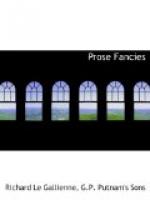Among the majority of literary and artistic people of late that eye of the beholder has been a very cynical supercilious eye. Never was such a bitter cruel war waged against the poor bourgeois. The lack of humanity in recent art and literature is infinitely depressing. Doubtless, it is the outcome of a so-called ‘realism,’ which dares to pretend that the truth about life is to be found on its grimy pock-marked surface. Over against the many robust developments of democracy, and doubtless inspired by them, is a marked spread of the aristocratic spirit—selfish, heartless, subtle, of mere physical ‘refinement’; a spirit, too, all the more inhuman because it is for the most part not tempered by any intercourse with homely dependants, as in the feudal aristocracy. It would seem to be the product of ‘the higher education,’ a university priggishness, poor as proud. It is the deadliest spirit abroad; but, of course, though it may poison life and especially art for a while, the great laughing democracy will in good time dispose of it as Hercules might crush a wasp.
This is the spirit that draws up its skirts and sneers to itself at poor ‘old bodies’ in omnibuses, because, forsooth, they are stout, and out of the fulness of the heart the mouth speaketh. One thinks of Falstaff’s plaintive ‘If to be fat is to be hated!’ At displays of natural feelings of any sort this comfortless evil spirit ever curls the lip. Inhabiting modern young ladies, it is especially superior to the maternal instinct, and cringes from a baby in a railway carriage as from an adder. At the dropping of an ‘h’ it shrinks as though the weighty letter had fallen upon its great toe, and it will forgive anything rather than a provincial accent. It lives entirely in the surfaces of things, and, as the surface of life is frequently rough and prickly, it is frequently uncomfortable. At such times it peevishly darts out its little sting, like a young snake angry with a farmer’s boot. It is amusing to watch it venting its spleen in papers the bourgeois never read, in pictures they don’t trouble to understand. John Bull’s indifference to the ‘new’ criticism is one of the most pleasing features of the time. Probably he has not yet heard a syllable of it, and, if he should hear, he would probably waive it aside with, ‘I have something more to think of than these megrims.’ And so he has. While these superior folk are wrangling about Degas and Mallarme, about ‘style’ and ‘distinction,’ he is doing the work of the world. There is nothing in life so much exaggerated as the importance of art. If it were all wiped off the surface of the earth to-morrow, the world would scarcely miss it. For what is art but a faint reflection of the beauty already sown broadcast over the face of the world? And that would remain. We should lose Leonardo and Titian, Velasquez and Rembrandt, and a great host of modern precious persons, but the stars and the great trees, the noble sculptured hills, the golden-dotted meadows, the airy sailing clouds, and all the regal pageantry of the seasons, would still be ours; and an almond-tree in flower would replace the National Gallery.




